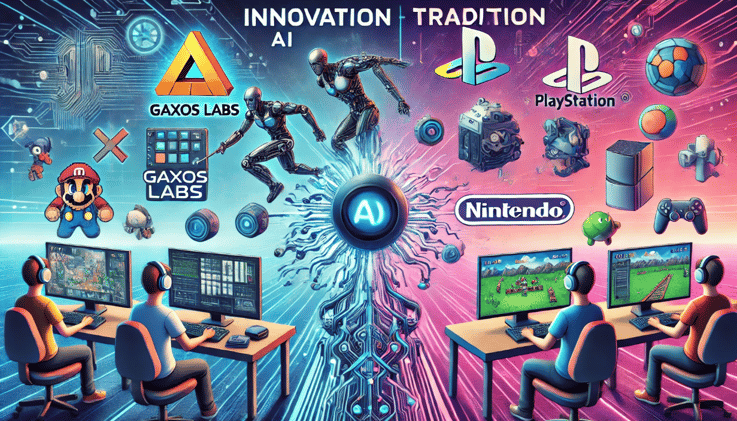The Gaming Industry Embraces AI-Powered Tools
The gaming industry is rapidly adopting artificial intelligence (AI)-powered tools, with companies like Gaxos.ai, PlayStation, and Series Entertainment leading the charge. These companies are leveraging AI to streamline game development, enhance customization, and reduce production costs. However, Nintendo is charting a different course, with no immediate plans to adopt AI in its game creation process.
Gaxos Labs: Revolutionizing Game Development
AI startup Gaxos.ai Inc. has recently unveiled Gaxos Labs, an AI-powered platform aimed at transforming game development and creating new revenue opportunities for developers. The platform combines Gaxos’ proprietary AI technology with popular tools like DALL-E and Stability.ai to generate game content quickly.
Features of Gaxos Labs
- AI-Generated Content: Gaxos Labs allows developers to efficiently create and manage AI-generated content using an asset editor and Unity plugin.
- Customization: The platform enables players to generate custom in-game content in real-time, potentially offering a new revenue stream through the sale of player-created cosmetic items.
- Increased Revenue: According to Gaxos CEO Vadim Mats, this technology could help studios increase revenue at a time when many are downsizing or closing.
PlayStation’s Use of AI in Game Development
Sony’s PlayStation division is also embracing AI, using it to accelerate development and reduce costs. According to a report by Insider Gaming, AI has already been used in Marvel’s Spider-Man 2 to automate subtitle synchronization, significantly reducing the time needed for this process.
Sony’s Investment in Volumetric Capture Technology
- High-Quality 3D Assets: PlayStation is investing in volumetric capture technology to generate high-quality 3D assets.
- Monetization: These assets, created across multiple Sony divisions, may even be sold externally in the future, further monetizing the technology.
Series Entertainment and the Rho Engine
Series Entertainment, an AI startup focused on game development, has raised $28 million in Series A funding from investors like Netflix, Dell Technologies Capital, and Andreessen Horowitz. Series is positioning its flagship product, the Rho Engine, as a comprehensive, AI-native full-stack game creation platform.
The Rho Engine’s Features
- Comprehensive Platform: Unlike other AI tools, which focus on specific tasks like bug fixing or AI assistance, the Rho Engine aims to streamline the entire game development process.
- Large Language Models (LLMs) and Generative AI: It uses LLMs and generative AI to create interactive non-player characters and expand customization options for players.
Nintendo’s AI-Free Approach
While much of the industry moves toward AI, Nintendo remains an outlier. In a recent interview with The New York Times, Shigeru Miyamoto, the creator of Mario and Zelda, stated that the company has no plans to incorporate AI into its game development process. This stance reflects Nintendo’s long-standing approach of focusing on innovative gameplay and creative storytelling rather than cutting-edge technology.
Nintendo’s Successful Approach
- Innovative Gameplay: Despite the industry’s shift towards AI, with 62% of game studios already using AI, Nintendo’s AI-free strategy has proven successful.
- Great Gameplay Triumphs Technical Advances: Games like Breath of the Wild and Super Mario Odyssey show that great gameplay can triumph over technical advances.
The Future of Gaming: What This Means
As AI continues to revolutionize the gaming industry, companies that adopt these tools are poised to enhance efficiency and unlock new revenue streams. However, the creative implications of AI in game development are still up for debate, with concerns about job displacement and the potential loss of human creativity. Nintendo’s choice to avoid AI underscores the diversity of approaches in the industry, and it will be interesting to see whether they maintain this stance as AI technology continues to evolve.
Conclusion
The gaming industry is rapidly embracing AI-powered tools, but Nintendo is taking a different path. While some companies are leveraging AI to streamline game development and enhance customization, Nintendo is focusing on innovative gameplay and creative storytelling. As the industry continues to evolve, it will be exciting to see how these different approaches shape the future of gaming.

